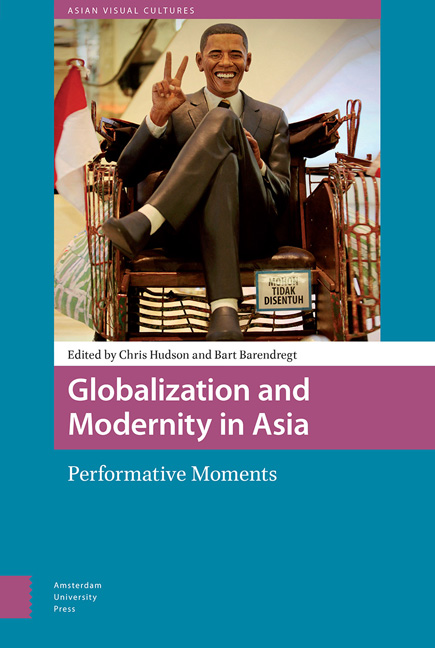Book contents
- Frontmatter
- Contents
- List of Figures
- Acknowledgments
- 1 Global Imaginaries and Performance in Asia
- 2 Globalizing the Imagination: Introductory Reflections
- 3 Weddings, Yoga, Hook-ups: Performed Identities and Technology in Bali
- 4 Super Premium Soft Double Vanilla Rich and the Ideal of Convenience in Japan
- 5 Unearthing the Past and Re-imagining the Present: Contemporary Art and Muslim Politics in a Post-9/11 World
- 6 Keeping Communists Alive in Singapore
- 7 Performative Pedagogies: Lifestyle Experts on Indian Television
- 8 Performing Cities: The Philippines Pavilion at the 2010 Shanghai International Exposition
- 9 Mobile Performance and the In-between: Yogyakarta Comes to Melbourne
- 10 An Islamist Flash Mob in the Streets of Shah Alam: Unstable Genres for Precarious Times
- 11 Pure Love?: Sanitized, Gendered and Multiple Modernities in Chinese Cinemas
- 12 Yogya on Stage
- Index
8 - Performing Cities: The Philippines Pavilion at the 2010 Shanghai International Exposition
Published online by Cambridge University Press: 11 December 2020
- Frontmatter
- Contents
- List of Figures
- Acknowledgments
- 1 Global Imaginaries and Performance in Asia
- 2 Globalizing the Imagination: Introductory Reflections
- 3 Weddings, Yoga, Hook-ups: Performed Identities and Technology in Bali
- 4 Super Premium Soft Double Vanilla Rich and the Ideal of Convenience in Japan
- 5 Unearthing the Past and Re-imagining the Present: Contemporary Art and Muslim Politics in a Post-9/11 World
- 6 Keeping Communists Alive in Singapore
- 7 Performative Pedagogies: Lifestyle Experts on Indian Television
- 8 Performing Cities: The Philippines Pavilion at the 2010 Shanghai International Exposition
- 9 Mobile Performance and the In-between: Yogyakarta Comes to Melbourne
- 10 An Islamist Flash Mob in the Streets of Shah Alam: Unstable Genres for Precarious Times
- 11 Pure Love?: Sanitized, Gendered and Multiple Modernities in Chinese Cinemas
- 12 Yogya on Stage
- Index
Summary
Abstract
With an attendance exceeding 70 million, the 2010 Shanghai International Exposition was the largest mass event in human history. With its theme of ‘Better City, Better Life,’ the expo offered the Philippines an opportunity to ‘perform’ the nation on a global stage. Their country pavilion featured live performance, while also seeking to demonstrate that it was a country of well-performing cities. This chapter seeks to determine what happened between design and execution and the eventual habitation of the pavilion by performers, audience members, and performing audiences, taking into consideration the flows of culture, capital and politics, while demonstrating how intra-Asian and intranational Filipino subjectivities appear to have hijacked the operation of the imagination as a cultural practice.
Keywords: Philippines, international expositions, cultural flows, artistic curation, politics and performance
With attendance in excess of 70 million, the 2010 Shanghai International Exposition was the single largest mass participation event in human history. Reflecting the enormous potential of expositions to have a direct, experiential impact on tens of millions of Chinese – many of them young and upwardly mobile – it was also one of the few expos successful at attracting the participation of virtually every country in the world. Significantly, among the larger free-standing pavilions were not only those from the wealthy Western countries, but also those of China's Asian neighbours, providing an unparalleled opportunity for intra-Asian cross-cultural communication and exchange. With its forward-looking theme of ‘Better City, Better Life,’ the expo offered Asian nations a chance to showcase their aspirational visions for a better urban life in a country that has witnessed the largest rural-urban migration in history.
Particularly complex in terms of the way it situated itself before a Chinese audience was the country pavilion of the Philippines, which both offered up live performance, and sought to demonstrate that it was also a country of well-performing cities. Building on its much-vaunted image as a country of performers, Marion Pastor Roces, curator of the pavilion, recalls how she ‘was able to sell the idea of performing cities, with performance having two registers,’ adding that their approach would offer up ‘a more organic view of cities’ (Pastor Roces 2014).
- Type
- Chapter
- Information
- Globalization and Modernity in AsiaPerformative Moments, pp. 129 - 148Publisher: Amsterdam University PressPrint publication year: 2018



